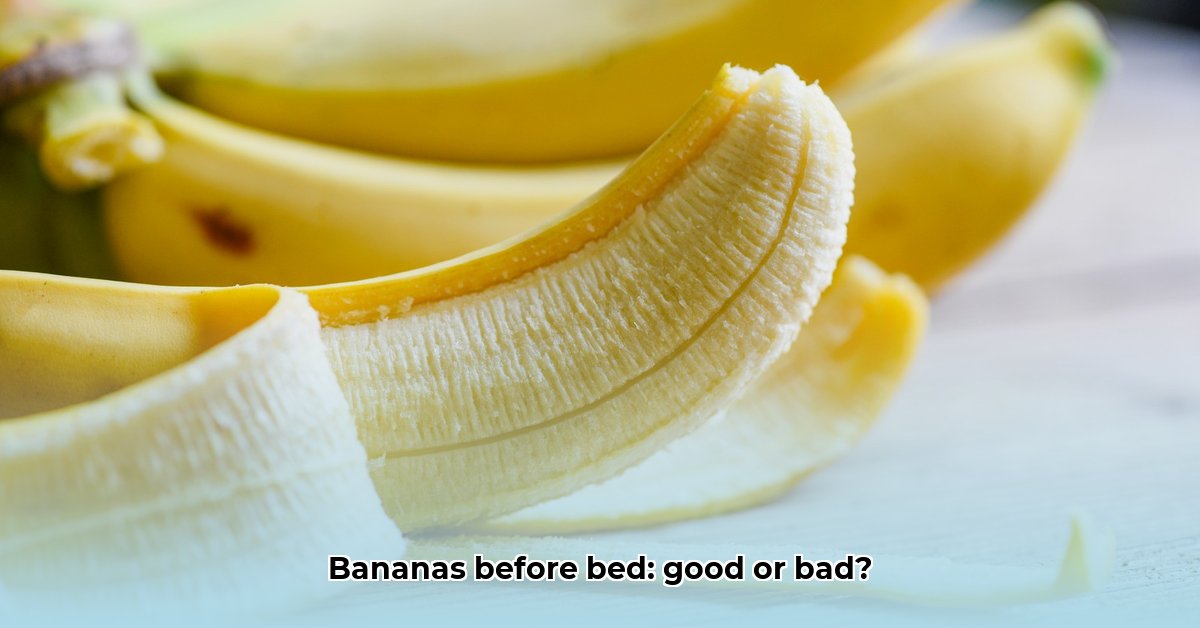Have you ever wondered if eating a banana before bed helps or hurts your sleep? The impact of bananas on sleep is a common topic of discussion, with arguments both for and against eating them before bed. For more on healthy eating habits, check out this helpful resource. In this article, we’ll explore the science behind eating bananas at night, looking at the potential benefits and drawbacks to help you decide if this popular snack is right for you.
The Truth About Bananas and Sleep
Is your nightly banana doing more harm than good? It’s a fair question, and the answer is complex, depending on individual factors. Like many things related to diet and health, how your body reacts to bananas at night is unique to you.
Bananas: A Nutritional Overview
Bananas offer several nutritional advantages. They’re a good source of potassium, which is important for muscle health and preventing nighttime cramps. They also contain magnesium, a mineral known for its relaxing effects, and vitamin B6, which is needed to produce serotonin and melatonin, hormones that regulate mood and sleep. Plus, bananas provide fiber, which helps you feel full and could prevent late-night hunger. But how do bananas fit into the sleep equation?
The Melatonin Factor
Bananas contain melatonin, a hormone that helps regulate the sleep-wake cycle. However, the amount of melatonin in a single banana is relatively small. This raises the question: Could even a small amount of extra melatonin affect sleep, especially in people who are sensitive to it, or is the amount too small to make a difference? More research is needed to fully understand how the melatonin in a banana affects sleep.
Ripe vs. Unripe: What’s the Difference?
The ripeness of a banana can change its effects. Riper bananas have more melatonin than less ripe ones, so if you’re concerned about melatonin, a less ripe banana might be a better choice. The ripeness also affects blood sugar levels, which is another thing to keep in mind.
How You React: Understanding Your Body
Everyone’s body is different, so it’s important to consider how your body reacts. Your natural melatonin production, how sensitive you are to melatonin, any sleep problems you have, and your overall diet all play a role in how a bedtime banana affects your sleep. Bananas are just one piece of the puzzle, not a guaranteed fix.
Weighing the Good and Bad
Here’s a look at the possible benefits and drawbacks:
Potential Benefits:
- Magnesium: Helps muscles relax and may boost melatonin production.
- Tryptophan: Helps make serotonin and melatonin.
- Fiber: Helps you feel full and stops late-night cravings.
- Potassium: Prevents muscle cramps and keeps nerves healthy.
- Vitamin B6: Supports the production of sleep hormones.
Potential Drawbacks:
- Melatonin (small amounts): Might cause vivid dreams or grogginess in some individuals.
- Sugar Content: Can lead to a temporary energy spike, potentially disrupting sleep for some.
- Digestive Issues: May cause bloating or gas in sensitive individuals.
The Key Takeaway: Experiment and Listen to Your Body
Whether or not eating a banana at night is healthy depends on you. While the nutrients in bananas could help you relax and sleep better, more research is needed to fully understand the impact of the small amount of melatonin they contain.
Here’s what you can do:
- Try It Out: Eat a banana one to two hours before bed for a few nights and see how you feel and how well you sleep.
- Consider Ripeness: If you’re worried about melatonin levels, choose bananas that are slightly less ripe, with fewer brown spots.
- Pay Attention to Your Body: If you notice any negative effects on your sleep, stop eating bananas before bed.
- Create a Good Sleep Routine: Go to bed and wake up at the same time every day, avoid caffeine late in the day, and make sure your bedroom is dark and quiet.
Ultimately, nutrition is personal. It’s about learning how your body responds to different foods and making choices that support your health. Don’t stress too much about the banana; instead, focus on living a healthy lifestyle that encourages restful sleep.
The Connection Between Banana Ripeness and Sleep: A Deeper Look
Unlocking the Secrets
Key Points:
- Bananas have tryptophan, magnesium, and potassium, which are linked to better sleep.
- How ripe a banana is affects its nutrients.
- Everyone reacts differently.
- Good sleep habits are essential.
- Bananas are just one part of a larger plan to sleep better.
Bananas and Sleep: A Closer Look
Many people think that eating a banana before bed can help you sleep better. Bananas have nutrients that might be good for sleep. For example, tryptophan is a precursor to serotonin and melatonin, which are important for regulating sleep. Bananas also have magnesium, which helps muscles relax, and potassium, which keeps nerves healthy. Are you getting enough of these important nutrients?
But are bananas really a sleep miracle? The answer is more complicated. While bananas have things that can help with sleep, the evidence isn’t clear. Most studies focus on individual nutrients, not bananas as a whole.
Ripeness Matters: How a Banana Changes
How ripe a banana is affects how it impacts sleep. As bananas get riper, their starch turns into sugars, which changes their glycemic index (GI). A higher GI means that your blood sugar rises faster. Rapid blood sugar spikes can disrupt sleep in some people. So, how ripe your banana is could slightly change how it affects you. If you’re sensitive to sugar or have pre-diabetes, a slightly less ripe banana might be a better choice.
Beyond Diet: The Importance of Sleep Habits
Even if you eat a perfectly ripe banana, don’t expect it to solve all your sleep problems. Good sleep habits are crucial and make a big difference.
This includes:
- Consistent Sleep Schedule: Going to bed and waking up at the same time every day, even on weekends.
- Relaxing Bedtime Routine: Avoiding screens and trying a warm bath or reading.
- Comfortable Sleep Environment: Making sure your room is dark, quiet, and cool.
- Regular Exercise: Being physically active can improve sleep.
- Balanced Diet: Eating a healthy diet is more important than any single food.
What Affects Your Reaction
How you respond to a banana before bed depends on several things: Can bananas help you sleep?
- Your Nutrient Levels: If you already have enough magnesium or tryptophan, getting more from a banana might not make a big difference.
- Your Gut Health: How well you digest food affects how well you absorb nutrients.
- Existing Health Issues: Sleep disorders, diabetes, or digestive problems can change how you react.
- Medications: Some medicines can interact with the nutrients in bananas.
What You Can Do
Want to see what happens? Try eating a banana one to two hours before bed. Pay attention to how it affects your sleep. If it helps, great! But if you don’t notice any change, don’t worry. Focus on building good sleep habits. That’s the best way to improve your sleep.
How Bananas Before Bed Affect Sleep Quality for Different Age Groups
Key Points:
- Bananas have nutrients like tryptophan, magnesium, and potassium that might help you sleep better.
- There’s not much scientific proof that directly links eating bananas to better sleep.
- The benefits are probably small and work best when combined with good sleep habits.
- Everyone reacts differently, so pay attention to how you feel after eating a banana before bed.
- For the best results, combine eating bananas with a healthy sleep routine.
What’s the Deal with Bananas and Sleep?
Many people think that eating a banana before bed helps you sleep better because of the tryptophan, magnesium, and potassium in the fruit. But is it really a sleep-boosting snack? Let’s find out!
The Science (or Lack Thereof)
While bananas have these nutrients that are linked to sleep, there’s not much direct evidence that eating them improves sleep. It’s not as simple as “eat a banana, sleep well.” What else do you need to consider?
What the Research Says (and Doesn’t)
Studies show that magnesium supplements can improve sleep. However, the amount of magnesium in a single banana isn’t enough to have this effect. Similarly, tryptophan has to compete with other amino acids to get to the brain. The amount in a banana might not be enough to make a big difference in serotonin and melatonin production. We need more evidence to fully understand the role of Bananas Before Bed: Impact on Sleep Quality for Different Age Groups.
Other Things to Think About
What else should you consider before eating bananas before bed?
How ripe the banana is matters. Ripe bananas have more melatonin, while unripe bananas have more fiber (which could affect digestion and sleep). Also, bananas have a moderate glycemic index. If you have diabetes or blood sugar problems, check your blood sugar after eating one. Finally, the potassium in bananas can interact with some medications; talk to your doctor if you’re taking any medications that affect potassium levels.
How to Include Bananas in Your Sleep Routine
Instead of expecting miracles, try adding a banana to a plan for improving your sleep.
- Timing: Eat a medium-sized banana about an hour before bed.
- Routine: Combine this with consistent sleep habits: a regular sleep schedule, a dark, quiet room, and ways to reduce stress.
- Personalization: Pay attention to how your body reacts. Some people might find it helpful, while others might not notice any difference.
- Consultation: Talk to a doctor or registered dietitian for personalized advice, especially if you have any health conditions or are taking medications.
A Balanced View
While it’s tempting to look for a quick fix, a comprehensive approach to sleep is always best. Bananas have some nutrients that can help with sleep, but they’re not a magic solution. Think of them as one part of a larger plan to improve your sleep, focusing on good sleep habits and a healthy diet. If you want more detailed and evidence-based information about nutrition and sleep, do some more research. The Sleep Foundation is a good place to start.
Banana Timing: Optimizing Sleep for People with Diabetes
Key Points:
- Bananas offer potassium, magnesium, and fiber, potentially helping sleep.
- The high carbohydrate content may raise blood sugar, disrupting sleep.
- Portion size, ripeness, and individual responses are important.
- Combining bananas with protein and fats may improve blood sugar control.
- Banana Consumption Timing: Optimizing Sleep for People with Diabetes requires individualized strategies. Talk to a healthcare professional.
Bananas: Good or Bad for Sleep?
If you have diabetes, can eating a banana late at night help or hurt your sleep? It’s a tricky question.
On one hand, bananas have nutrients like magnesium and potassium, which are known to help muscles relax and promote sleep. They also contain tryptophan, which is a precursor to melatonin, the sleep hormone.
However, bananas are also full of carbohydrates, mostly sugars. For people with diabetes, this can potentially lead to blood sugar changes, even overnight.
Timing Matters
The question of when to eat a banana is key. Could it be more helpful if you eat it at a different time?
Moderation and Personalization
The goal isn’t to completely avoid bananas, but to eat them in moderation and in a way that works for you. Eating smaller portions, choosing less ripe bananas (which have a lower glycemic index), and combining your banana with protein or healthy fats can help keep your blood sugar steady. Always check your blood sugar after eating to see how your body reacts.
Consider these steps:
- Monitor: Check your blood sugar levels carefully for a few days after eating a banana.
- Experiment: Try eating a banana at different times and see how it affects your blood sugar and sleep.
- Combine: Eat your banana with protein (like nuts or yogurt) and healthy fats (like a small amount of peanut butter) to slow down sugar absorption.
- Choose Wisely: Pick bananas that are less ripe, as they tend to have a lower glycemic index.
- Consult: Talk to your doctor or dietitian about your banana habits. They can give you personalized advice.
The Big Picture
This is about managing your diabetes in a way that works for you. Everyone reacts to food differently. The best way to figure out what works is to pay attention to your body’s signals. How it affects your sleep depends on the person.
[This article is based on information from various sources and is intended for educational purposes only. It is not medical advice. Please consult your doctor or registered dietitian for personalized guidance.]
- Compartment Food Containers Make Meal Prep and Lunch Packing Easy - February 10, 2026
- Divided Lunch Containers Revolutionize Your Meal Prep Strategy - February 9, 2026
- Divided Food Storage Containers Transform Meal Prep and Portion Control - February 8, 2026










